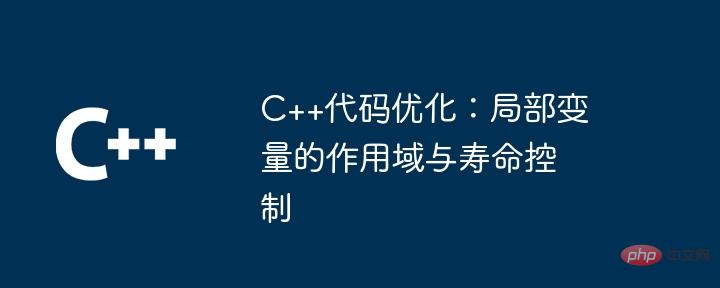
Local variable optimization: Control scope: Limit the scope of local variables and use them only when needed to avoid unnecessary memory usage. Shorten the lifetime: Use block scoping and RAII to shorten the lifetime of local variables and free the memory when it is no longer needed. Avoid unnecessary copies and moves: Use references or pointers to pass local variables to save running time and memory consumption. Use constants: Declare immutable local variables as const to improve compiler optimization capabilities.

C++ Code Optimization: Scope and Lifetime Control of Local Variables
The scope and lifecycle of variables are important for optimizing C++ code Crucial. Understanding these aspects of local variables can improve the performance and efficiency of your code.
Scope
The scope of a local variable refers to which parts of the code it can be accessed. In C++, the scope of a local variable begins at the point where it is declared and ends at the end of the block of code in which it is contained.
For example:
void function() {
int a; // 局部变量的作用域从这里开始
std::cout << a << std::endl; // 可以访问局部变量 'a'
{
int b; // 嵌套作用域中的局部变量
std::cout << b << std::endl; // 可以访问局部变量 'b'
}
// 不能访问嵌套作用域中的局部变量 'b'
}Lifetime
The lifespan of a local variable refers to the time it exists in memory. In C++, the life of a local variable begins when it is defined and ends when the block of code in which it exists exits.
For example:
void function() {
{
int a; // 局部变量 'a' 的寿命从这里开始
std::cout << a << std::endl; // 可以访问 'a'
} // 局部变量 'a' 的寿命在此处结束,不再可以访问
{
int b; // 新的局部变量 'b' 的寿命从这里开始
std::cout << b << std::endl; // 可以访问 'b'
} // 局部变量 'b' 的寿命在此处结束,不再可以访问
}Optimization
C++ code can be optimized by controlling the scope and lifetime of local variables:
Practical case
In the following code, buffer is declared as a local variable, which will cause unnecessary memory overhead and Performance degradation:
void function(int size) {
int *buffer = new int[size]; // 局部变量,可能浪费大量内存
for (int i = 0; i < size; i++) {
buffer[i] = i;
}
delete[] buffer; // 记得释放内存
}The code can be optimized by declaring buffer as a parameter of the function and using smart pointers to manage the memory:
void function(int size) {
std::unique_ptr<int[]> buffer(new int[size]); // 智能指针管理内存
for (int i = 0; i < size; i++) {
buffer[i] = i;
}
} // 内存自动释放,无需显式调用 delete[]The above is the detailed content of C++ code optimization: scope and lifetime control of local variables. For more information, please follow other related articles on the PHP Chinese website!
 What are the differences between c++ and c language
What are the differences between c++ and c language
 Recommended learning order for c++ and python
Recommended learning order for c++ and python
 Cost-effectiveness analysis of learning python and c++
Cost-effectiveness analysis of learning python and c++
 Is c language the same as c++?
Is c language the same as c++?
 Which is better to learn first, c language or c++?
Which is better to learn first, c language or c++?
 The difference and connection between c language and c++
The difference and connection between c language and c++
 C++ software Chinese change tutorial
C++ software Chinese change tutorial
 Cost-effectiveness analysis of learning python, java and c++
Cost-effectiveness analysis of learning python, java and c++




